News
It's Hard Out There For Non-Humans
I hate to be the bearer of bad news, but it seems like our non-human neighbors here on Earth are getting a seriously raw deal. In fact, that's kind of an understatement — wildlife population has declined 52 percent since 1970, according to the World Wildlife Fund's 2014 Living Planet Report, which was released Tuesday. And if that strikes you as an eye-popping figure, well, you're right. The breakdown, as the WWF lays out on its website, is pretty straightforward: Terrestrial species declined 39 percent from 1970 to 2010, the same for marine species.
Freshwater species, on the other hand, natives of countless rivers, lakes, and streams of the world, have been hit especially hard with an average decline of 76 percent over that same 40-year window. It paints a grim picture and practically yells the questions: Why did this happen, and what can we change?
Well, if you believe the report, there's a familiar host of human behavioral culprits at play, from overtaxing of natural resources, to overhunting, to overfishing (the toll on the Pacific Ocean's marine populations have suffered through commercial fishing operations has been staggering). It all adds up to that shocking, dire realization: Our planet has less than half the creatures it did in 1970. So much for stewardship of the earth, huh?
Of course, some caveats are in order, as with any study making such a dramatic claim — it's all based off of a representative sampling of over 10,000 populations of "mammals, birds, reptiles, amphibians, and fish," according to the report, encompassing 3,038 different species. Marco Lambertini, the director general of the WWF, made his pitch for how to change our course in the report's introduction.
We need a few things to change. First, we need unity around a common cause. Public, private and civil society sectors need to pull together in a bold and coordinated effort. Second, we need leadership for change. Sitting on the bench waiting for someone else to make the first move doesn’t work. Heads of state need to start thinking globally; businesses and consumers need to stop behaving as if we live in a limitless world.
The report also cites environmental degradation through pollutants and climate change as factors in the harrowing decline, though assessing how much harm climate change has done is less precisely measurable then, say, how many forests have been stripped bare. Here are a few of the data points the report cited to help explain this worrying trend:
- A whopping 92 percent of our global water-use footprint is for agricultural purposes, and as traditionally low-income countries develop, and the global population swells, this is putting a greater strain on the water supply. If you're looking for a dramatic recent example of this, just take a look at the Aral Sea.
- It seems like whenever you're talking about environmental decline, the excesses of the so-called first world are never far behind. And that's true here, as well, with the per capita ecological footprint of high-income nations more than five times that of low-income nations.
- Our planet, sad to say, is a finite resource. While it can renew itself through the generations, if we tax it too hard, it won't be able to. And at our current pace, we're doing just that — the report states that our current rates of consumption would require an earth 1.5 times its actual size to keep up.
Basically, we're living exactly the sort of unsustainable lifestyle you might expect for the self-interested, top-dog species of a naturally abundant planet. And that's a problem that has to turn around, even as we shouldn't force impoverished communities to bear the burden of first-world extravagance, as Lambertini acknowledges.
We cannot protect nature without also recognizing the needs and aspirations of people, and the right to development. But equally, we cannot have development or meet the needs and aspirations of people without protecting nature. Things look so worrying that it may seem difficult to feel positive about the future. Difficult, certainly, but not impossible – because it is in ourselves, who have caused the problem, that we can find the solution. And it is by acknowledging the problem and understanding the drivers of decline that we can find the insights and, more importantly, the determination to put things right.
Hear hear, Mr. Director General. If you've got the time, you should really scroll through the entire report for yourself. These are perilous times for our planet and its creatures, and awareness is always half the struggle.
Images: Getty Images (3)
